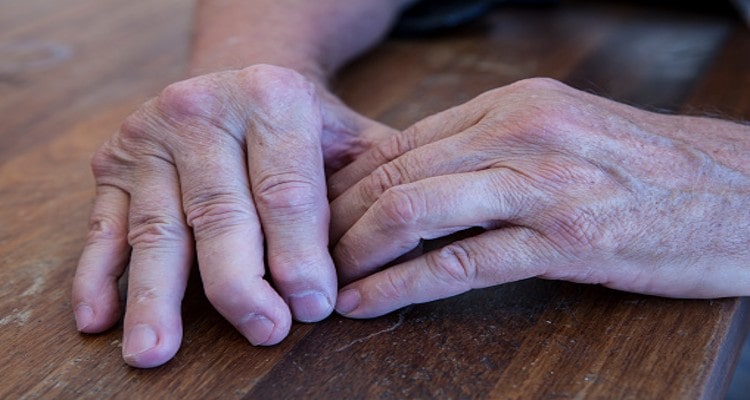The Best Fluffy Pancakes recipe you will fall in love with. Full of tips and tricks to help you make the best pancakes.

If you are experiencing joint stiffness, pain, and swelling that is worse in the morning or after periods of inactivity, you may be experiencing Psoriatic Arthritis Symptoms and Signs. This condition affects many people who also have psoriasis – a skin condition that causes red, scaly patches.

Although there is no cure for psoriatic arthritis, early diagnosis and treatment can help reduce symptoms and improve quality of life. In this article, we will discuss the early warning signs and symptoms of psoriatic arthritis so that you can get the help you need right away.
What Is Psoriatic Arthritis?
Psoriatic arthritis is a form of arthritis that affects people with psoriasis. It is a chronic, inflammatory condition that can cause joint damage and deformity if left untreated. The symptoms of psoriatic arthritis include:
– Joint stiffness
– Joint pain
– Swelling in the joints
– Morning stiffness
– Fatigue
– Loss of range of motion in the joints
In some cases, psoriatic arthritis can also cause nail changes, such as pitting or separation from the nail bed, and eye inflammation. Psoriatic arthritis is a progressive condition, which means that it will gradually get worse over time. However, treatment can help to slow down the progression of the disease and reduce symptoms.
Who Is at Risk for Psoriatic Arthritis?
Psoriatic arthritis is most common in adults between the ages of 30 and 50. However, it can affect people of all ages, including children. The condition is more common in women than men.
People with psoriasis are at a higher risk for developing psoriatic arthritis. In fact, about 30% of people with psoriasis will eventually develop psoriatic arthritis. If you have a family member with psoriatic arthritis, you may also be at a higher risk for the condition.
What Causes Psoriatic Arthritis?
The exact cause of psoriatic arthritis is unknown. However, it is believed to be caused by a combination of genetic and environmental factors. Researchers have identified certain genes that are associated with an increased risk for psoriatic arthritis.
These genes are involved in the body’s immune response. It is thought that a combination of these genes and environmental factors, such as infection or injury, trigger the development of psoriatic arthritis.
What are the early warning Psoriatic Arthritis Symptoms and Signs?
If you are experiencing any of the following early warning Psoriatic Arthritis Symptoms and Signs, you should see a doctor right away. These psoriatic arthritis signs and symptoms include:
– Joint stiffness
– Joint pain
– Swelling in the joints
– Morning stiffness
– Fatigue
– Loss of range of motion in the joints
If you have psoriasis, it is important to be aware of the signs and symptoms of psoriatic arthritis. Early diagnosis and treatment can help to reduce symptoms and prevent joint damage. Your Doctor will be able to diagnose the condition and develop a treatment plan that is right for you.
ALSO Read: The #5 Best CBD Gummies of 2022 for Pain, Inflammation, Anxiety, Stress and Better Sleep
Treating Psoriatic Arthritis
There is no cure for psoriatic arthritis. However, treatment can help to reduce symptoms and improve quality of life. Treatment for psoriatic arthritis usually involves a combination of medication and lifestyle changes. Medications used to treat psoriatic arthritis include:
– (NSAIDs) Nonsteroidal anti-inflammatory drugs : These drugs can help to reduce pain and inflammation.
– (DMARDs) Disease-modifying antirheumatic drugs : These drugs can slow the progression of psoriatic arthritis and prevent joint damage.
– Biologic agents: These are newer medications that work by targeting specific proteins involved in the immune response.
In addition to medication, lifestyle changes such as exercise, weight loss, and stress reduction can also help to reduce symptoms of psoriatic arthritis.
If you think you may have psoriatic arthritis, it is important to see a doctor so that you can get started on the best treatment for you. Early diagnosis and treatment is essential for preventing joint damage and deformity.
Psoriatic Arthritis Symptoms and Signs, Treatment – Video
What triggers psoriatic arthritis?
The exact cause of psoriatic arthritis is unknown. However, it is believed to be caused by a combination of genetic and environmental factors. Researchers have identified certain genes that are associated with an increased risk for psoriatic arthritis.
These genes are involved in the body’s immune response. It is thought that a combination of these genes and environmental factors, such as infection or injury, trigger the development of psoriatic arthritis.
If you have psoriasis, it is important to be aware of the signs and symptoms of psoriatic arthritis. Early diagnosis and treatment can help to reduce symptoms and prevent joint damage.
If you think you may have psoriatic arthritis, make an appointment with your doctor. They will be able to diagnose the condition and develop a treatment plan that is right for you.
Can you treat psoriatic arthritis without medication?
There is no cure for psoriatic arthritis. However, treatment can help to reduce symptoms and improve quality of life. Treatment for psoriatic arthritis usually involves a combination of medication and lifestyle changes. Medications used to treat psoriatic arthritis include:
– Nonsteroidal anti-inflammatory drugs (NSAIDs): These drugs can help to reduce pain and inflammation.
– Disease-modifying antirheumatic drugs (DMARDs): These drugs can slow the progression of psoriatic arthritis and prevent joint damage.
– Biologic agents: These are newer medications that work by targeting specific proteins involved in the immune response.
In addition to medication, lifestyle changes such as exercise, weight loss, and stress reduction can also help to reduce symptoms of psoriatic arthritis.
It is important to see a doctor so that you can get started on the best treatment for you. Early diagnosis and treatment are essential for preventing joint damage and deformity for anyone experiencing Psoriatic Arthritis Symptoms and Signs.
Psoriatic arthritis can be a difficult condition to manage. However, with the right treatment plan, many people can live happy and healthy lives. Early diagnosis and treatment are essential for preventing joint damage and deformity. Thanks for reading! I hope this was helpful!
Does Psoriatic Arthritis Show up on X-Ray?
psoriatic arthritis may show up on an x-ray as joint damage, bone spurs, or soft tissue swelling. However, X-rays are not always able to definitively diagnose psoriatic arthritis.
If your doctor suspects that you have psoriatic arthritis, they may order additional psoriatic arthritis test, such as blood tests or MRI, to confirm the diagnosis. Thanks for reading! I hope this was helpful!
What is the first-line treatment for psoriatic arthritis?
The first-line treatment for psoriatic arthritis is typically a combination of medication and lifestyle changes. You may be required to take psoriatic arthritis symptoms quiz before any treatment can commence. Medications used to treat psoriatic arthritis include:
– Nonsteroidal anti-inflammatory drugs (NSAIDs): These drugs can help to reduce pain and inflammation.
– Disease-modifying antirheumatic drugs (DMARDs): These drugs can slow the progression of psoriatic arthritis and prevent joint damage.
– Biologic agents: These are newer medications that work by targeting specific proteins involved in the immune response.
In addition to medication, lifestyle changes such as exercise, weight loss, and stress reduction can also help to reduce symptoms of psoriatic arthritis. If you think you may have psoriatic arthritis.
Is psoriatic arthritis worse than rheumatoid arthritis?
There is no definitive answer to this question. psoriatic arthritis and rheumatoid arthritis are both chronic, progressive conditions that can cause joint damage and deformity.
However, each person experiences the condition differently. Some people may find that psoriatic arthritis is more debilitating than rheumatoid arthritis, while others may find that rheumatoid arthritis is worse.
The best way to determine which condition is worse for you is to speak with your doctor about your symptoms and experience.
What does psoriatic arthritis pain feel like?
Psoriatic arthritis pain can vary depending on the individual. Some people may experience a dull, aching pain, while others may feel sharp, shooting pain. The pain may be constant or it may come and go. Many people with psoriatic arthritis also experience morning stiffness as one of symptoms of psoriatic arthritis flare, and psoriatic arthritis rash.
If you are experiencing psoriatic arthritis pain or Psoriatic Arthritis Symptoms and Signs, it is important to speak with your doctor so that you can get started on the best treatment for you. Thanks for reading! I hope this was helpful!
What are the long-term effects of psoriatic arthritis?
If psoriatic arthritis is left untreated, it can lead to joint damage and deformity. Additionally, psoriatic arthritis can also cause fatigue and disability. While there is no cure for psoriatic arthritis, early diagnosis and treatment are essential for preventing joint damage and deformity psoriatic arthritis diet. Thanks for reading! I hope this was helpful!
If you have psoriatic arthritis, can you still have children?
Yes, you can still have children if you have psoriatic arthritis. However, psoriatic arthritis can make pregnancy and childbirth more difficult. If you are planning on becoming pregnant, it is important to speak with your doctor about how to best manage your symptoms. Thanks for reading! I hope this was helpful!
Are there any home remedies for psoriatic arthritis?
There is no cure for psoriatic arthritis, but there are some home remedies that may help to reduce symptoms. Some home remedies for psoriatic arthritis include:
– Take warm baths or showers to help reduce pain and stiffness.
– Applying heat or cold packs to painful joints.
– Exercising regularly to maintain joint function and flexibility.
– Eating a healthy diet to support overall health and well-being.
If you are living with Psoriatic Arthritis Symptoms and Signs, it is important to speak with your doctor about the best treatment options for you. Thanks for reading! I hope this was helpful!
Take care! :)” psoriatic arthritis can be a difficult condition to manage, but there are treatments available that can help. If you think you may have psoriatic arthritis, it is important to speak with your doctor so that you can get started on the best treatment for you. Thanks for reading! I hope this was helpful!
Please feel free to leave any questions or comments below! Take care! :)” psoriatic arthritis can be a difficult condition to manage, but there are treatments available that can help. If you think you may have psoriatic arthritis, it is important to speak with your doctor so that you can get started on the best treatment for you.
Thanks for reading! I hope this on Psoriatic Arthritis Symptoms and Signs was helpful! Please feel free to leave any questions or comments below!
ALSO Read: The #5 Best CBD Gummies of 2022 for Pain, Inflammation, Anxiety, Stress and Better Sleep







